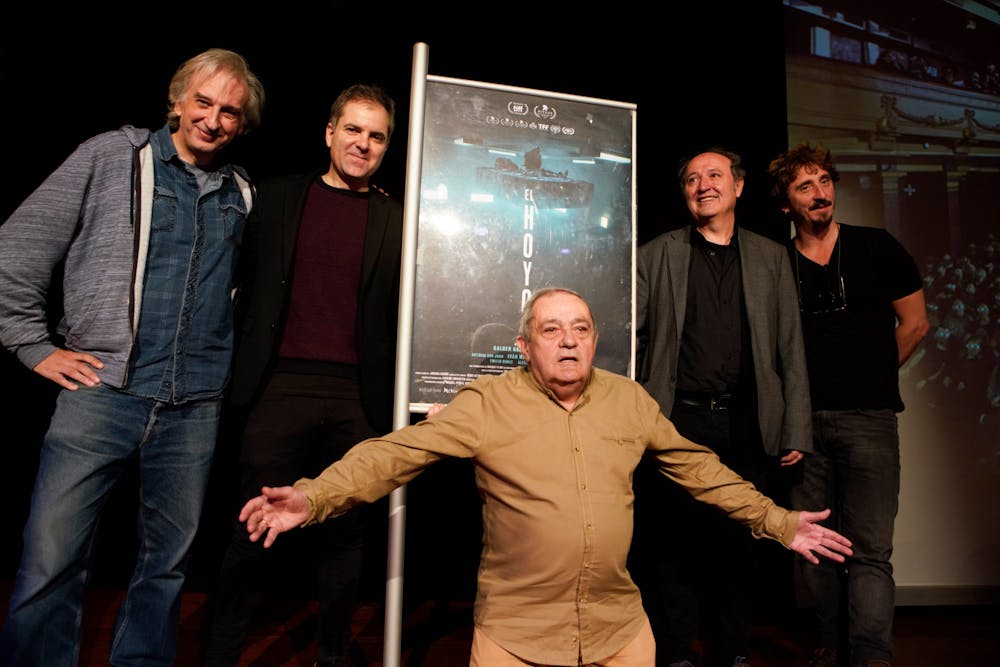On Oct. 4, Netflix released The Platform 2 which is a Spanish dystopian thriller that reimagines the prison system as a vertical self-management center. A second installment to The Platform universe, the movie begins with two cellmates Zamiatin (Hovik Keuchkerian) and Perempuán (Milena Smit) who wake up on level 24 of the prison.
New to the facility, the two strangers turn to other inmates for information about the “pit.” The facility, or ”pit,” is a massive, multilevel tower that houses two inmates per level. At the center of each floor is a large, square-shaped opening through which a platform passes to deliver food. In an ideal scenario, everyone is able to eat a dish because the platform accounts for every person in the facility; however, conflict occurs when one person eats more than what was prepared for them. This causes a dire situation where people on the bottom floors receive no food and people at higher floors can consume as much as they want.
The opening scenes include flashbacks of Zamiatin and Perempuán's individual initiation interviews where an undisclosed staff member asks them questions about their favorite food and life background. We also learn that their food choice is crucial, as whatever they choose is later added to the platform for their consumption. Zamiatin chooses pizza, and Perempuán chooses ham croquettes.
On their first day in the pit, Zamiatin and Perempuán are informed by an inmate on level 23 about the “loyalist's law,“ which states that each person only eats their chosen dish unless a voluntary swap is agreed upon. This introduces some social tension within the prison population. The Loyalists are a group that enforces the law by communicating level by level, recruiting new initiates and punishing those who disobey. In opposition to this group are the Barbarians, who believe that each person should be at liberty to eat as much as they want. Inevitably, violence ensues as each group attempts to overpower the other.
The Platform 2 is notably a gory film. The thriller doesn't shy away from oozing blood, disfigured body parts and graphic nudity. This pairs well with the film’s exploration of the effect of hunger on human mentality. The film imagines a world where the absence of food can drive humanity to an unreasonable state of mind. All of these elements make the facility seem like a calculated social experiment which causes audience members to question the integrity of the prison's mission.
The construction of the dystopian world points to an obvious attempt for the film to create commentary on current political and social structures. The levels of the facility represent class stratification and how power at higher levels is being abused. Food distribution through the platform becomes an allegory to capitalism and the detrimental effects it has on people in lower classes. Although the film doesn’t directly address communism, the Loyalist's agenda alludes to its practices in which there are no classes and each person only eats one dish. The challenge of The Platform films is to progress the plot and characters without dragging its commentary too far.
The Platform creates a nice balance between the political and social commentary and character development, but The Platform 2 has trouble tying these elements together. The film's fixation on the Loyalist versus Barbarian agendas leads it to fall short on its pacing and character development. Additionally, the lack of characterization makes the audience question the credibility of the group solidarity and creation of factions.
For example, the Loyalists rely on fearmongering and violence to recruit new members, but it's questionable how little resistance there is amongst these recruits. The film suggests that people either agree with one faction or the other — it doesn't consider the possibility that there would be no group organization at all. Immediate group cooperation unevenly paces plot points throughout the movie.
While some may enjoy the commentary and dystopian world building of The Platform 2, it is fair to argue that the film hovers over a certain level of corniness. Viewers of the first movie might find it a disappointing second installment, but perhaps they might think differently if they looked past the political themes. Nevertheless, if you're looking for a standard dystopian, gory and mind bending movie this Halloween, The Platform and The Platform 2 might be good ones to add to your list.





